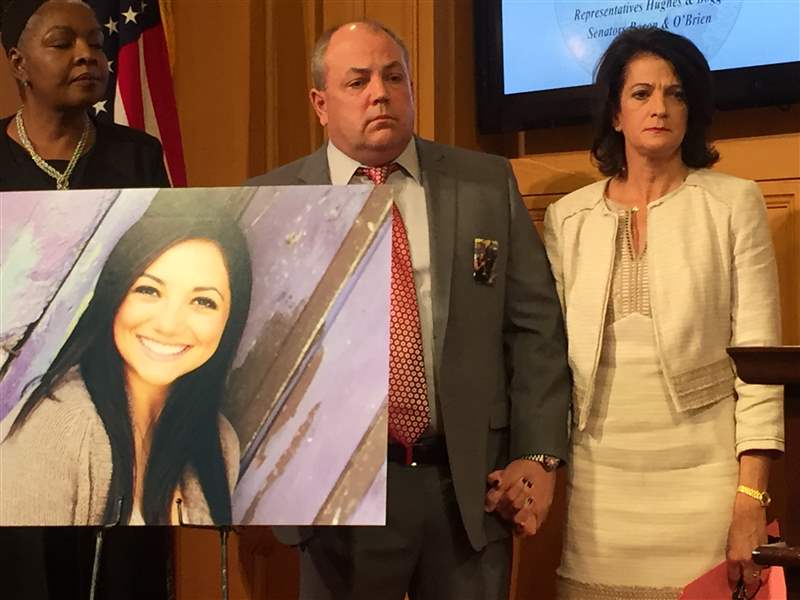
Ohio House passes Reagan Tokes Act
6/20/2018
Toby Tokes, center, and his wife, Lisa McCrary-Tokes, stand next to a photo of their murdered daughter, Reagan. They are joined on the left by state Rep. Bernadine Kennedy Kent (D., Columbus).
The Blade/Jim Provance
Buy This Image

Reagan Tokes
COLUMBUS — The Ohio House on Wednesday overwhelmingly approved changes to Ohio’s sentencing and parole systems, which were at least partially blamed by the parents of former Monclova Township resident Reagan Tokes for the murder of their daughter.
House Bill 365 goes further than another Tokes-inspired sentencing bill recently passed by the Senate. The House version addresses parole officer caseloads and the monitoring of offender GPS units like that worn by Ms. Tokes’ killer, Brian Lee Golsby.
This version now goes to the Senate but is not expected to see action before lawmakers recess next week for the summer.
“The man convicted of Reagan Tokes’ murder was released homeless and fitted with a GPS monitor without any restrictions associated with it,” said Rep. Kristin Boggs (D., Columbus), who sponsored the bill with Rep. Jim Hughes (R., Columbus).
“He committed six armed robberies before he abducted and killed Reagan, all while under GPS supervision…,” she said. “The person monitoring the GPS is incapable of knowing whether the person being monitored is where they’re supposed to be or where they shouldn’t be unless we place restrictions on that monitor.”
Golsby was sentenced to multiple life sentences for the murder, kidnapping, rape, and robbery of the 21-year-old Ohio State University psychology senior. He had been recently released from prison after completing a sentence for attempted rape.
His GPS ankle device collected data that was retroactively used to place him at the scene of each robbery and key locations involved in Ms. Tokes’ murder on Feb. 8, 2017. His path crossed with hers at random as she left work at a Columbus restaurant. He forced her to withdraw cash from an automated teller machine, raped her, shot her twice in the head at a suburban park, and then stole her car.
Her estate has sued the state in the Ohio Court of Claims even as her parents, Toby Tokes and Lisa McCrary-Tokes, have worked with lawmakers to reforming the system.
“I have a daughter the same age,” Mr. Hughes said. “I cannot imagine the circumstances they’ve had to cope with. I also recognize that they’re a part of the process to ensure that no more innocent lives are taken as their daughter was taken from them.”
The bill passed by a vote of 83-3. No one spoke against the bill on the House floor, and no northwest Ohio representatives were among the “no” votes.
Some opponents have voiced concern about the potential price tag associated with the reforms, one reason that the parole and GPS provisions have yet to see a Senate vote.
Like the Senate version, the House bill would mark a return in Ohio law to indefinite sentencing with minimum and maximum ranges. The idea is to spur inmates to behave and improve themselves while behind bars to avoid being held up to 50 percent longer than the minimum sentence.
The Reagan Tokes Act would also allow the Department of Rehabilitation and Correction to recommend reducing the minimum sentence for exceptional conduct behind bars.
Authorities would have to specify restrictions on supervised inmates’ activities such as curfews and limits on where they may go. It would require the state to develop a system that monitors that GPS data and provide alerts when violations occur.
Such a system would also have to include a program allowing law enforcement to correlate that GPS data with crime scene information.
It would prohibit DRC from releasing inmates directly onto the street if they have no place to go.
The Adult Parole Authority would have to establish maximum caseload limits for parole officers and hire enough officers to meet those standards.
“We have significantly less parole officers today than we did 10 years ago, but unfortunately we do not have less people on parole,” Ms. Boggs said.
Contact Jim Provance at jprovance@theblade.com or 614-221-0496.